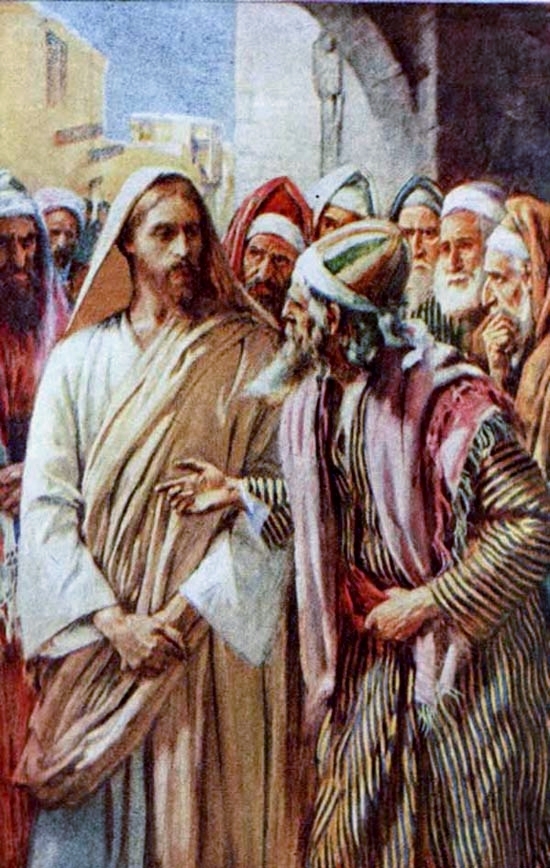
28And
one of the scribes came, and having heard them reasoning together, and
perceiving that he had answered them well, asked him, Which is the first commandment of all?
29And Jesus answered him, The first of all the commandments is, Hear, O Israel; The Lord our God (Theos) is one Lord:
30And
thou shalt love the Lord thy God with all thy heart, and with all thy
soul, and with all thy mind, and with all thy strength: this is the first commandment.
31And the second is like, namely this, Thou shalt love thy neighbour as thyself. There is none other commandment greater than these.
32And the scribe said unto him, Well, Master, thou hast said the truth: for there is one God; and there is none other but he:
33And
to love him with all the heart, and with all the understanding, and
with all the soul, and with all the strength, and to love his neighbour as himself, is more than all whole burnt offerings and sacrifices.
34And
when Jesus saw that he answered discreetly, he said unto him, Thou art
not far from the kingdom of God. And no man after that durst ask him any question. Mark 12:28-34
Now these are the commandments, the statutes, and the judgments, which the Lord your God commanded to teach you, that ye might do them in the land whither ye go to possess it:
2 That thou mightest fear the Lord
thy God, to keep all his statutes and his commandments, which I command
thee, thou, and thy son, and thy son's son, all the days of thy life;
and that thy days may be prolonged.
3 Hear therefore, O Israel, and observe to do it; that it may be well with thee, and that ye may increase mightily, as the Lord God of thy fathers hath promised thee, in the land that floweth with milk and honey.
4 Hear, O Israel: The Lord our God (Elohim) is one Lord:
5 And thou shalt love the Lord thy God with all thine heart, and with all thy soul, and with all thy might.
6 And these words, which I command thee this day, shall be in thine heart:
7 And
thou shalt teach them diligently unto thy children, and shalt talk of
them when thou sittest in thine house, and when thou walkest by the way,
and when thou liest down, and when thou risest up. Deuteronomy 6:4
Theos : God, a god
Original Word: θεός, οῦ, ὁ
Part of Speech: Noun, Feminine; Noun, Masculine
Transliteration: theos
Phonetic Spelling: (theh'-os)
Definition: God, a god
Usage: (a) God, (b) a god, generally.
Part of Speech: Noun, Feminine; Noun, Masculine
Transliteration: theos
Phonetic Spelling: (theh'-os)
Definition: God, a god
Usage: (a) God, (b) a god, generally.
2316 theós (of unknown origin) – properly, God, the Creator and owner of all things (Jn 1:3; Gen 1 - 3).
[Long before the NT was written, 2316 (theós) referred to the supreme being who owns and sustains all things.]
Elohim, singular Eloah, (Hebrew: God), the God of Israel in the Old Testament.
A plural of majesty, the term Elohim—though sometimes used for other
deities, such as the Moabite god Chemosh, the Sidonian goddess Astarte,
and also for other majestic beings such as angels, kings, judges (the
Old Testament shofeṭim), and the Messiah—is usually employed in
the Old Testament for the one and only God of Israel, whose personal
name was revealed to Moses as YHWH, or Yahweh (q.v.). When referring to Yahweh, elohim very often is accompanied by the article ha-, to mean, in combination, “the God,” and sometimes with a further identification Elohim ḥayyim, meaning “the living God.”
Though Elohim is plural in form, it is understood in the singular sense. Thus, in Genesis the words, “In the beginning God (Elohim) created the heavens and the earth,” Elohim is monotheistic in connotation,
though its grammatical structure seems polytheistic. The Israelites
probably borrowed the Canaanite plural noun Elohim and made it singular
in meaning in their cultic practices and theological reflections. Encyclopaedia Britannica
No comments:
Post a Comment